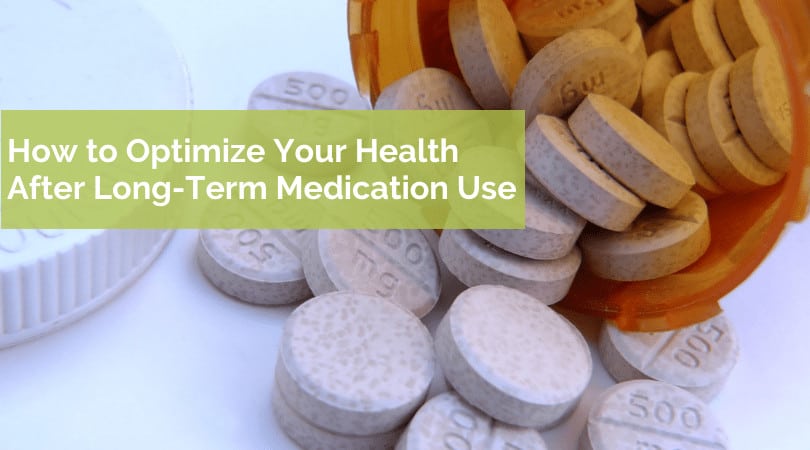
How to Optimize your Health in conjunction with Long-Term Medication Use
As you get older, it’s very common to take more medications to help manage certain health concerns. Unfortunately, long-term medication use doesn’t come without its own potential risks and can take a toll on your body. Here are some ways to help minimize these effects and how to cleanse your body from medication.
Medication Use Statistics
The use of prescription medications, or drugs that are prescribed by an appropriate healthcare provider, has been steadily rising over the years. The use of these medications is especially prominent among the elderly population.
In fact, adults 65 years and older make up around 13% of the total United States population and account for an estimated third of total prescription medication use. This age group is more likely to be prescribed multiple medications over long periods of time.
Some of the most common reasons why people are prescribed medications as they age include things like reducing high cholesterol and blood pressure, improving blood sugar for diabetes management, to alleviate joint and general pain, for improving sleep or anxiety, and to managing urinary incontinence.
How Medications Can Become Problematic
With more medication use comes an increase in the potential for misuse and abuse of these substances. Long-term use of medications can have unintentional side effects on your health if not managed properly.
The older population is at a higher risk for misuse of medication. This could be a result of difficulty reading or understanding instructions for use, poor health literacy, language barriers, as well as cognitive and memory impairments that could lead to missing doses or otherwise taking medications incorrectly.
When they’re not used correctly or as intended, prescription medications can have adverse health effects. The potential side effects, and the degree of their severity, depend on the specific medication and may not show up right away.
Additionally, prescription medications may interact with other substances, such as other prescriptions, dietary supplements, herbs, alcohol, and even certain nutrients in food and drinks. If the user isn’t aware, it could have more negative effects on health.
How to Promote Medication Detox
If you’ve been taking them for a while, you may be wondering how to detox your body from prescription drugs. Perhaps you’re concerned about the amount of medication you’ve been taking, or how long, and looking to minimize any potentially negative effects. While there isn’t a true “detox” plan, there are several things you can do to help alleviate potential stressors.
The first and most important aspect of approaching a medication “detox” is to make sure that you’re taking the medication in the amount, schedule, and way it was originally intended and prescribed.
To keep you on track, it may be helpful to use a 7-day medication dispenser that you divide your doses into at the beginning of each week. Setting an alarm to take them at the same time every day is also a good idea to promote consistency.
If you’ve been taking medication for a while, it’s a good idea to speak with your doctor to make sure it’s still appropriate to use it. In some cases, the medication may have only been needed for a temporary period. It’s not uncommon for people to forget why they needed medication in the first place, or that their dosing schedule may need to be adjusted.
It’s also possible that the reason you began using it is no longer relevant, and continuing to take the medication may no longer be necessary. However, it’s important to note that you should not stop taking medication or change your usage of it without first speaking to your doctor.
Some medications need to be tapered over time, and may have amplified negative effects if you stop them too quickly. Professional supervision is important for your safety.
Helpful Lifestyle Habits
You can do other things to improve your overall health, like adopting preventive habits. Consequently, this may help minimize the amount of prescription drugs you need moving forward.
For example, take a look at what you eat, your exercise habits, and other lifestyle factors like alcohol consumption, hydration, and whether you smoke. Something as basic as maintaining a healthy weight can make all the difference in reducing potential for diabetes, heart disease, stroke, and many other common causes for long term medication use.
If there are areas that could be addressed by small changes to your health routine, this could help reduce the medications you’re taking to manage certain conditions. Speaking to your doctor, or a dietitian, can be helpful.
If you have been taking medications over a long period, you may be wondering how to detox from medication. While there’s no quick-fix, the best things you can do are make sure your medication regimen is appropriate and consider lifestyle habits that may naturally reduce the need for medications.
References
- Basca B. The elderly and prescription drug misuse and abuse. Accessed September 8, 2021. http://www.cars-rp.org/publications/Prevention%20Tactics/PT09.02.08.pdf
- Center for Drug Evaluation, Research. Medicines and You: A Guide for Older Adults. Accessed September 8, 2021. https://www.fda.gov/drugs/resources-you-drugs/medicines-and-you-guide-older-adults
- Should You Take Whey Protein Powder After Surgery? - March 2, 2023
- How Much Protein is Too Much? - January 30, 2023
- Is Whey Protein Keto Friendly? - January 30, 2023





